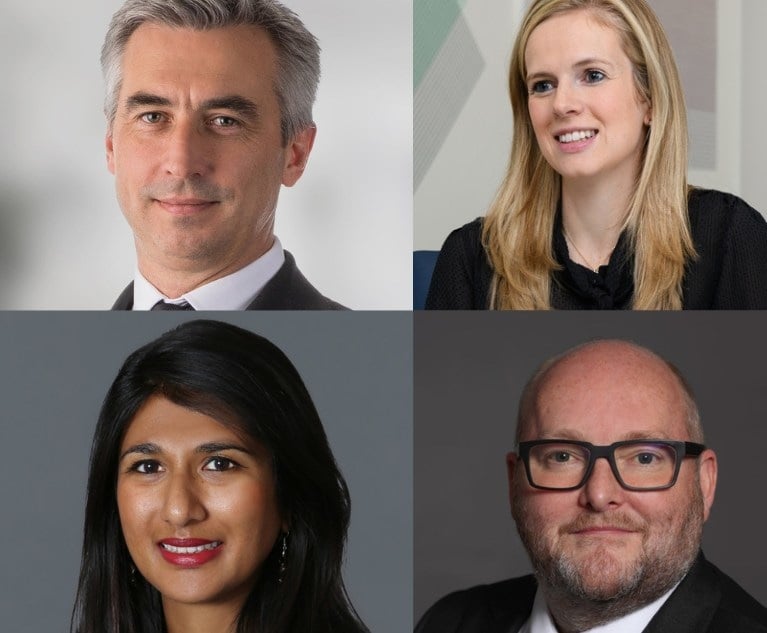Law Firms Make a Push to Improve the Associate Experience
It may be long overdue, but firms are embracing a range of new ideas, up to and including a shorter path to partnership.
June 28, 2018 at 07:00 AM
6 minute read

For too long, Big Law associates were neglected. This may sound like a silly description for a group starting their careers earning jealousy-provoking salaries that are now pushing $200,000 at some firms, but beyond the money, the associate experience was rotten, and this had consequences.
“Having observed associates, it's a horrible life,” says Janet Stanton of Adam Smith Esq. “Here you have people who are so ambitious and so hungry, and they're in the basement of a building reviewing documents.”
But a growing list of associate-facing initiatives suggests that firms are recognizing that their young lawyers are worthy of investment. One reason is the belated recognition that even if former associates make partner elsewhere or go in-house, they can be valuable connections.
“There's a recognition that if you don't give your associates a good experience and they move on and become clients, it's an untapped opportunity,” says Marcie Borgal Shunk, president of the Tilt Institute. “Historically, the associate was expected to come in, serve as an associate for a number of years and either become partner or—if they didn't become partner—there wasn't a whole lot of value assigned to that. This has shifted.”
The size of associate classes also has been shrinking.
“Firms can and need to invest more in each individual,” says Bruce MacEwen, also with Adam Smith.
Consequently, firms are sinking a number of finite commodities—money, time, internal resources—into measures to improve the associate experience. In some cases, they're restructuring the entire timeline. And they also profess to be listening closer to these—yes, we'll say it—millennials, who have different expectations for the workplace from previous generations.
Travel
Associates at global firms want to feel they are not siloed off in a single office.
Betty Temple, chair and CEO of Womble Bond Dickinson in the United States, says the firm's associates pitched a transatlantic exchange program to aid with the integration between North Carolina-based Womble Carlyle Sandridge & Rice and the U.K.'s Bond Dickinson. That was after firm leaders realized it would be worth soliciting young lawyers for ideas.
“At law firms, as partners, it's so typical for us to come up with programs and ideas, instead of the people who understand how they themselves integrate, communicate and build bridges differently than we do,” Temple says.
Six U.K. lawyers visited the firm's offices in Atlanta and Charlotte in May, and five U.S. lawyers will make the reverse trip in the fall. Temple notes the hard costs of moving 11 bodies across the ocean as well as the soft costs involved: the time of the associates, partner-sponsors and talent development personnel. But she is certain the return will be worth it.
“I think the more you do to involve all the levels of the firm, once you get them involved in the future, you'll get long-term return on investment,” Temple says.
Likewise, Reed Smith has launched its own interoffice secondment program that gives lawyers the chance to apply to spend one or two weeks, or even more, at any of the firm's 28 offices around the world. Global head of legal personnel Casey Ryan estimates the cost of each at between $2,500 and $10,000.
Leave and Return
Firms are also unveiling policies that extend the amount of parental leave that associates receive, while lightening their load when they return to work. In the last year, Shearman & Sterling, Orrick, Herrington & Sutcliffe and Morrison & Foerster have all broadened their allowances for leave time. And in May, Reed Smith announced it would reduce hour requirements for attorneys returning from any form of leave.
“It's resulted in the most effusive and grateful reaction from associates, and I think in a way its cost is the least,” Ryan says, placing it in the context of a suite of initiatives the firm announced in May.
Innovation Time
Reed Smith also is forgoing potential billable hours by giving associates credit for time spent on certain professional development activities or on researching advances in legal technology and operations.
Ryan says the new policy will likely lead to attorneys qualifying for bonuses to which they might not otherwise be entitled.
“That's some of the best money we can spend per year,” she said. “The cost is offset by the attraction of very strong talent and the retention of the very good talent that we have.”
Other firms are taking different approaches to give their young attorneys the capability to innovate and be savvy about business.
Bryan Cave, which earlier this year combined with Berwin Leighton Paisner, for several years has been holding a “business academy” for its associates, who have been invited into hackathons to develop new software solutions.
Simpson Thacher & Bartlett is also targeting associate training as a strategy to increase the efficiency of its processes. The firm announced in June that it would pair with Columbia Business School on an eight-day intensive orientation for all incoming associates on business and financial literacy skills. And Womble Bond has launched a leadership training program for associates in years three to seven.
“Law firms are moving in the direction of finding how to create a place for business professionals and how to have attorneys take a greater role in leading and driving value for the firm,” Borgal Shunk says.
Annual Reviews
Firms don't need to spend money to dump their existing annual review procedures or to de-emphasize them in favor of ongoing evaluations.
In recent months, Allen & Overy and Hogan Lovells have both announced they will scrap annual reviews completely. This follows what MacEwen calls “tremendous disenchantment with the process in the corporate world.”
“They're perfunctory: a day late and a dollar short,” he says.
Reed Smith, meanwhile, is not ditching these reviews entirely but supplementing them with an app-based system that allows for continuous feedback from every lawyer with whom an associate works. Allen & Overy is rolling out its own app with a similar aim.
The Path to Partnership
Weil, Gotshal & Manges may be spending more on salaries when it cuts the length of its partnership track by two years, as the firm announced in May. Nonequity partners and of counsel attorneys in their eighth year at the firm will both earn more than current eighth-year associates.
The firm is presenting the change as a tactic to hang onto associates who otherwise might be tempted to jump ship in year four or five.
It's almost elegant in its simplicity. The easiest way to improve the talent pipeline may simply be to shorten it.
Email: [email protected]
This content has been archived. It is available through our partners, LexisNexis® and Bloomberg Law.
To view this content, please continue to their sites.
Not a Lexis Subscriber?
Subscribe Now
Not a Bloomberg Law Subscriber?
Subscribe Now
NOT FOR REPRINT
© 2025 ALM Global, LLC, All Rights Reserved. Request academic re-use from www.copyright.com. All other uses, submit a request to [email protected]. For more information visit Asset & Logo Licensing.
You Might Like
View All

Trending Stories
- 1Trump Administration Faces Legal Challenge Over EO Impacting Federal Workers
- 2Supreme Court Considers Reviving Lawsuit Over Fatal Traffic Stop Shooting
- 3Long Hours and Lack Of Boundaries: Associates In India Are Leaving Their Firms
- 4Goodwin Procter Relocates to Renewable-Powered Office in San Francisco’s Financial District
- 5'Didn't Notice Patient Wasn't Breathing': $13.7M Verdict Against Anesthesiologists
Who Got The Work
J. Brugh Lower of Gibbons has entered an appearance for industrial equipment supplier Devco Corporation in a pending trademark infringement lawsuit. The suit, accusing the defendant of selling knock-off Graco products, was filed Dec. 18 in New Jersey District Court by Rivkin Radler on behalf of Graco Inc. and Graco Minnesota. The case, assigned to U.S. District Judge Zahid N. Quraishi, is 3:24-cv-11294, Graco Inc. et al v. Devco Corporation.
Who Got The Work
Rebecca Maller-Stein and Kent A. Yalowitz of Arnold & Porter Kaye Scholer have entered their appearances for Hanaco Venture Capital and its executives, Lior Prosor and David Frankel, in a pending securities lawsuit. The action, filed on Dec. 24 in New York Southern District Court by Zell, Aron & Co. on behalf of Goldeneye Advisors, accuses the defendants of negligently and fraudulently managing the plaintiff's $1 million investment. The case, assigned to U.S. District Judge Vernon S. Broderick, is 1:24-cv-09918, Goldeneye Advisors, LLC v. Hanaco Venture Capital, Ltd. et al.
Who Got The Work
Attorneys from A&O Shearman has stepped in as defense counsel for Toronto-Dominion Bank and other defendants in a pending securities class action. The suit, filed Dec. 11 in New York Southern District Court by Bleichmar Fonti & Auld, accuses the defendants of concealing the bank's 'pervasive' deficiencies in regards to its compliance with the Bank Secrecy Act and the quality of its anti-money laundering controls. The case, assigned to U.S. District Judge Arun Subramanian, is 1:24-cv-09445, Gonzalez v. The Toronto-Dominion Bank et al.
Who Got The Work
Crown Castle International, a Pennsylvania company providing shared communications infrastructure, has turned to Luke D. Wolf of Gordon Rees Scully Mansukhani to fend off a pending breach-of-contract lawsuit. The court action, filed Nov. 25 in Michigan Eastern District Court by Hooper Hathaway PC on behalf of The Town Residences LLC, accuses Crown Castle of failing to transfer approximately $30,000 in utility payments from T-Mobile in breach of a roof-top lease and assignment agreement. The case, assigned to U.S. District Judge Susan K. Declercq, is 2:24-cv-13131, The Town Residences LLC v. T-Mobile US, Inc. et al.
Who Got The Work
Wilfred P. Coronato and Daniel M. Schwartz of McCarter & English have stepped in as defense counsel to Electrolux Home Products Inc. in a pending product liability lawsuit. The court action, filed Nov. 26 in New York Eastern District Court by Poulos Lopiccolo PC and Nagel Rice LLP on behalf of David Stern, alleges that the defendant's refrigerators’ drawers and shelving repeatedly break and fall apart within months after purchase. The case, assigned to U.S. District Judge Joan M. Azrack, is 2:24-cv-08204, Stern v. Electrolux Home Products, Inc.
Featured Firms
Law Offices of Gary Martin Hays & Associates, P.C.
(470) 294-1674
Law Offices of Mark E. Salomone
(857) 444-6468
Smith & Hassler
(713) 739-1250











